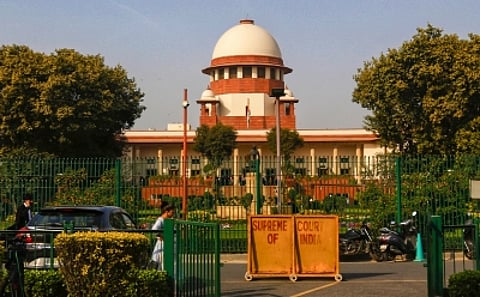
New Delhi- In a significant judicial intervention, the Supreme Court on May 1, 2025, disposed of Kuwait-based NRI Neeraj Purbia's Special Leave Petition challenging the Rajasthan High Court's February 20, 2025 order in the ₹1.83 crore graft case involving DySP Jitendra Anchaliya and others.
While refusing interference under Article 136, the bench of Justices Pankaj Mithal and S.V.N. Bhatti issued a crucial safeguard: observations in the impugned High Court order shall not influence the trial's merits. This effectively nullifies the Rajasthan HC's disputed endorsement of a second ACB investigation that had exonerated DySP Anchaliya after an initial probe found him guilty.
The NRI ₹1.83 crore graft case, a high-profile legal battle involving allegations of extortion and corruption, centers around Neeraj Purbia, a non-resident Indian (NRI), who claimed to have been defrauded by police personnel and private individuals in Rajasthan. The case originated from a complaint lodged with the Anti-Corruption Bureau (ACB), which conducted an initial investigation and filed a chargesheet (No. 83/2023) under Sections 7, 7A, and 12 of the Prevention of Corruption Act, 1988, as amended, and Sections 384 and 120B of the Indian Penal Code.
The case presents a rare instance of diametrically opposed investigative outcomes. The ACB's first chargesheet (No.83/2023) meticulously detailed how Anchaliya, SI Roshanlal, and private individuals Ramesh Rathore and Manoj Shrimali allegedly coerced Purbia into repurchasing his own property through threats of imprisonment and passport confiscation.
However, a subsequent 2024 reinvestigation by IO Kailash Singh Sandoo, conducted without mandatory court approval as mandated in Vinay Tyagi vs Irshad Ali – abruptly cleared the accused.
The matter escalated to the High Court of Rajasthan at Jodhpur, where the petitioner filed a Criminal Writ Petition (S.B. Criminal Writ Petition No. 1731/2024) seeking an impartial and CBI investigation. Concurrently, the accused filed multiple Criminal Miscellaneous Petitions, primarily requesting the quashing of the FIR and chargesheet. The High Court declined to quash the FIR against the RPS officer.
On February 20, 2025, the High Court dismissed Purbia’s writ petition and disposed of the accused’s petitions with directions to the trial court to consider the subsequent investigation report, which favored the accused.
The High Court directed the trial court to assess the entirety of the investigative material, including both the initial charge sheet and the supplementary report, before deciding on the framing of charges or discharge of the accused.
The High Court's reliance on this procedurally suspect supplementary report, while dismissing Purbia's plea for a CBI probe, formed the core of the Supreme Court challenge.
The petitioner argued that the High Court’s reliance on the subsequent investigation, conducted without proper authorization, was legally untenable and that its observations could prejudice the trial. Aggrieved by the High Court’s order, Purbia filed Special Leave Petitions (SLP (Crl.) Nos. 6462-6467/2025) before the Supreme Court, seeking to set aside the impugned order.
On May 1, 2025, the Supreme Court, presided over by Justices Pankaj Mithal and S.V.N. Bhatti, heard the Special Leave Petition. The petitioner, represented by senior advocate Ardhendumauli Kumar Prasad, contended that the High Court’s order was flawed as it dismissed the plea for a fair investigation while issuing directions based on an unauthorized subsequent investigation. The petitioner highlighted that the initial ACB investigation had established the guilt of the accused, but the reinvestigation by Kailash Singh Sandhu, conducted without court or departmental approval, undermined the chargesheet. Furthermore, the petitioner argued that the High Court’s observations, which appeared to endorse the subsequent investigation, could unduly influence the trial court, compromising the fairness of the judicial process.
The Supreme Court, after hearing the arguments, delivered a significant order that addressed the core issues raised in the petitions. The bench declined to interfere with the High Court’s order under Article 136 of the Constitution, which grants the Supreme Court discretionary powers to hear appeals. However, the Court made a crucial clarification: " it is made clear that the observations made in the order impugned shall not affect the merits of the trial." This directive ensures that the trial court will adjudicate the case based on evidence and legal merits, free from the influence of the High Court’s remarks, particularly those related to the subsequent investigation.
According to legal experts, the Supreme Court’s ruling has profound implications, particularly regarding the validity of the subsequent investigation. By emphasizing that the trial must proceed on its merits, the Court has effectively nullified the impact of the subsequent investigation report, which the High Court had directed the trial court to consider. This aligns with established legal principles, as articulated in the Supreme Court’s judgment in Vinay Tyagi v. Irshad Ali (2012), which distinguishes between “further investigation” and “reinvestigation.” The Vinay Tyagi case clarified that reinvestigation, which involves a fresh probe into the same matter, is generally impermissible without specific court authorization, unlike further investigation, which supplements existing findings.
As the case returns to the trial court, the focus will shift to the evidence presented in the original ACB chargesheet and the arguments of both parties. The Supreme Court’s directive ensures that the trial court will evaluate the case afresh, without being influenced by the High Court’s observations or the subsequent investigation’s findings.
Read the order here:
You can also join our WhatsApp group to get premium and selected news of The Mooknayak on WhatsApp. Click here to join the WhatsApp group.